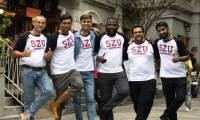Humanmobility restrictions is effective strategy to control COVID-19 outbreak
Humanmobility restrictions is effective strategy to control COVID-19 outbreak
BEIJING, Aug. 11 (Xinhua) -- Researchers have disclosed that humanmobility restrictions is effective strategy to control COVID-19 spreading in Shenzhen, south China’s Guangdong Province.
The researchers from the Shenzhen University has developed a model to quantify the potential effects of various intraCity mobility restrictions on the spreading of COVID-19 and controlling the pandemic.
Since Anonymous and aggregated mobile phone data of individuals in Shenzhen city age from 15-65 year-old were collected to build a susceptible–exposed–infectious–recovered transmission model for COVID-19.
As reported in The Lancet Digital Health, the authors found20-60% reduction in the mobility within the city had a notable effect on controlling COVID-19 spread. Specifically, as less as 20% mobility restriction can achieve a flattening of the peak number of cases by 33% and a delay to the peak number by 2 weeks . With 40% mobility restriction, the peak number cases can be reduced by 66% and 4 weeks delay; while 60% mobility restriction can achieve more than 90% reduction of the peak number cases and 14 weeks of delay. The effects of mobility restriction on controlling COVID-19 spreading can be increased by combination with other non-drug control measures. For example, quarantine of 80% COVID-19patients can delay the epidemic peak by 2 weeks.
In conclusion, the application of this model will help city governor to make decision on optimal COVID-19 controlling policy, with which the society can be the most benefitted by balancing the potential damage caused by COVID-19 and economic- social costs.
Enditem








用户登录
还没有账号?
立即注册